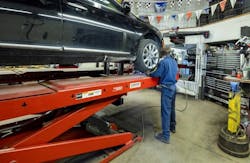You read that headline right. The customer is most definitely not always right — in the automotive retail space, at least. Most customers know very little about their cars, let alone how to repair them. To default to the opinion of the customer every single time is a disastrous approach to customer satisfaction.
Would you give all your retirement money to someone who knew next to nothing about retirement planning? No! So why does the axiom “the customer is always right” persist? Because it sounds good. It sounds like you are prioritizing the needs and happiness of a customer over pinching pennies or making profit.
But just doing what the customer says — especially when they are angry or upset — rarely results in a solution where the customer will happily return to your dealership. If a customer doesn’t know how a vehicle works or how to fix it, how can they possibly know — out of all the potential solutions — which fix not only works best, but will also make them happy?
Let’s even look at this from a non-hostile situation. Let’s say a customer who drives a relatively new performance vehicle wants new tires, but thinks S-rated tires will do just fine. Or maybe the customer wants to change the size of their tires and wheels and picked a new size out of thin air. The customer is not always right.
We work in what I call a “double negative” environment. People will gleefully upgrade their two-year-old phone for $1,500. But when you tell them that a new set of tires — which will make them safer on the road — is the same price, the look of disappointment they display is very common.
That two-punch combo — little knowledge and a resistance to spending money — makes the automotive aftermarket a very challenging place. It can be difficult to deal with multiple customers who have their guard up so high every day.
This is why the continued professionalization of our industry is so important. You can’t just hire a salesperson who knows something about cars or is still selling like it’s 1985. Today’s professional service advisor needs to be quite skilled at engaging the customer at all levels of emotional state, while assuring them that the second biggest purchase of their life is in good hands and that they will be treated with respect.
You see, the most important thing a professional can do is to make sure that the customer makes the most informed decision possible — not just any decision.
In order to do that, the customer must spend time listening to your service advisor. If the customer is in an agitated state, listening usually isn’t a high priority, so the advisor has to learn techniques that will allow the customer to vent and first be heard. Only after an upset customer feels they are being heard will they be willing to listen.
Quite commonly, after being treated respectfully, a customer will change their mind on the demand they made just a few minutes ago.
On the occasion where a customer is asking us to do something unsafe with their vehicle, again you have to let the customer be heard and ask some probing questions — not just lecture them on the rules. If you probe for more information, you may end up learning they thought they could save money doing this. You then can educate them on why their request won’t end up saving them money. If you use the customer’s own reasons to educate them, you are more likely to find agreement somewhere.
It is critical to start providing the aforementioned skills to the people on your front lines. And provide them with opportunities to learn effective negotiation skills. Proper negotiation skills can help sales advisors protect price integrity and leverage other negotiables, such as time frame or scope of work.
If 2022 showed us anything, it’s that customers are willing to pay a higher price for goods and services, but expect high-quality returns on that price. Professionalizing your sales advisor role will go a long way to adding value to the high cost of today’s vehicle repairs, maintenance and tires. Customers need you to be trusted advisor, as they understand less and less about how their vehicles work.





